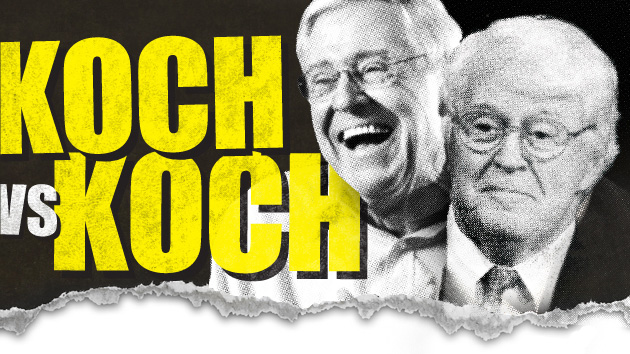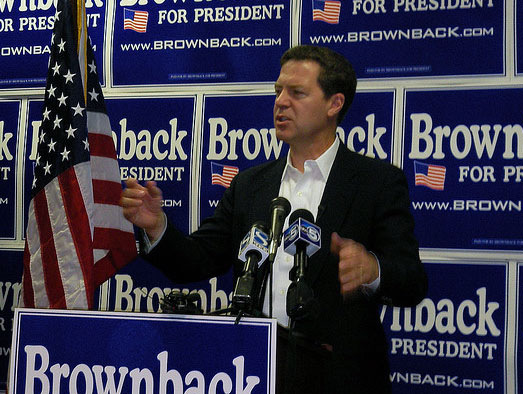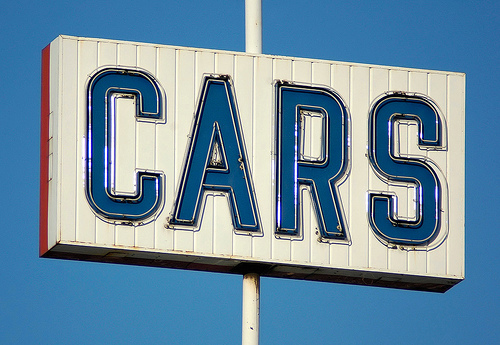
One Wednesday afternoon in mid-August, Govs. Sam Brownback of Kansas and Chris Christie of New Jersey stopped for a photo op—and $54 worth of pork ribs and sausages—at Oklahoma Joe’s, a gas station barbecue joint on the outer fringe of Kansas City. Along with hickory smoke and diesel fumes, there was a mild aroma of desperation in the air. Brownback’s approval ratings hovered in the mid-30s, and one recent poll had his Democratic opponent, state House Minority Leader Paul Davis, beating him by 10 points. Now Christie, the chair of the Republican Governors Association, had parachuted in to lend some star power as Brownback made a fundraising swing through the wealthy suburbs outside of Kansas City. A day earlier, the RGA had announced a $600,000 ad buy in support of Brownback. “We believe in Sam,” Christie assured the scrum of reporters who’d accompanied the governors to Oklahoma Joe’s.
That the RGA had been forced to mobilize reinforcements in Kansas spoke to just how imperiled Brownback had become. After representing Kansas for nearly two decades in Congress, he had won the governorship in 2010 by a 30-point margin. Once in office, Brownback wasted no time implementing a radical agenda that blended his trademark social conservatism with the libertarian-tinged economic agenda favored by one of his most famous constituents, Charles Koch, whose family company is headquartered in Wichita and employs more than 3,500 people in the state. Other GOP governors elected in the tea party wave, such as Wisconsin’s Scott Walker, garnered more ink for their brash policy maneuvers, but in many ways Brownback had presided over the most sweeping transformation.
Early in his tenure, he said he wanted to turn Kansas into a “real, live experiment” for right-wing policies. In some cases relying on proposals promoted by the Kansas Policy Institute—a conservative think tank that belongs to the Koch-backed State Policy Network and is chaired by a former top aide to Charles Koch—Brownback led the charge to privatize Medicaid, curb the power of teachers’ unions, and cull thousands from the welfare rolls.
But his boldest move was a massive income tax cut. Brownback flew in Reagan tax cut guru Arthur Laffer to help sell the plan to lawmakers, with the state paying the father of supply-side economics $75,000 for three days of work. Brownback and his legislative allies ultimately wiped out the top rate of 6.45 percent, slashed the middle rate from 6.25 to 4.9 percent, and dropped the bottom tier from 3.5 to 3 percent. A subsequent bill set in motion future cuts, with the top rate declining to 3.9 percent by 2018 and falling incrementally from there. Brownback’s tax plan also absolved nearly 200,000 small business owners of their state income tax burdens. Among the “small” businesses that qualified were more than 20 Koch Industries LLCs. “Without question they’re the biggest beneficiaries of the tax cuts,” says University of Kansas political scientist Burdett Loomis.
Laffer told me that “what Sam Brownback has done is and will be extraordinarily beneficial for the state of Kansas,” but many Kansans beg to differ. Brownback had said that his tax cut plan would provide “a shot of adrenaline into the heart of the Kansas economy.” Instead, the state has gone into cardiac arrest. “The revenue projections were just horrendous once the tax cuts were put into place,” Loomis says. The state’s $700 million budget surplus is projected to dwindle into a $238 million deficit. Standard & Poor’s and Moody’s downgraded the state’s bond rating earlier this year as a result. “The state’s on a crisis course,” says H. Edward Flentje, a professor emeritus of political science at Wichita State University who served alongside Brownback in the cabinet of Kansas Gov. Mike Hayden in the 1980s. “He has literally put us in a ditch.”
Conservatives once celebrated Brownback’s grand tax experiment as a prototype worthy of replication in other states and lauded Brownback himself as a model conservative reformer (“phenomenal,” Grover Norquist has said). “My focus,” Brownback said in one 2013 interview, “is to create a red-state model that allows the Republican ticket to say, ‘See, we’ve got a different way, and it works.'” By this fall it was hard to imagine anyone touting the Brownback model, especially with the Kansas governor at risk of going down in defeat—in the Koch brothers’ backyard, no less—and dragging the entire state ticket down with him. The Wall Street Journal recently dubbed Brownback’s approach “more of a warning than a beacon.”
Not long after taking office in 2011, Brownback called a meeting with members of the state Senate’s Republican caucus, whose tone was historically set by a core group of moderates. After a friendly introduction over tea and cookies on the veranda of the Capitol, the governor made clear that he would brook no dissent. “He said, ‘I’ll be glad to campaign for you coming up, but I want all of my guns pointed in the same direction,’ meaning there’s no room for difference of opinion,” recalls former GOP state Sen. Jean Schodorf, who was present that day. “From there on it was chilling.”
When it came to Brownback’s tax plan, Schodorf and her fellow moderates rebelled, warning that it would send the state budget into a tailspin. Though the cuts passed anyway, Brownback didn’t take the betrayal lightly. Together with the local chapter of Americans for Prosperity—the outfit founded and partly funded by the Koch brothers—and the state Chamber of Commerce (over which Koch Industries is said to wield an outsize influence), Brownback and his allies mobilized an effort to purge the naysayers. They recruited right-wing primary challengers, and AFP and the Chamber dumped hundreds of thousands of dollars into cleaning house. Brownback’s chief of staff, David Kensinger, reportedly called a meeting with the state’s top lobbyists, telling them to pony up contributions to each challenger or they could forget about asking the governor’s office to hear them out in the future. (In 2012, Kensinger opened his own lobbying shop. It has since come under FBI scrutiny for possible influence-peddling in connection with the privatization of Kansas’ Medicaid program.)
Meanwhile, the moderates were all but frozen out of their caucus. “There were decisions being made that the moderates didn’t know about,” Schodorf says. “The tolerance of being a moderate was gone. It was rough. People were not polite.”
Schodorf and eight other Republican moderates wound up losing their primaries in 2012. In January 2013, the day after her term expired, Schodorf and her daughter went to the county registrar’s office to formally switch their party affiliations. The 64-year-old is now the Democratic nominee for secretary of state.
While her ousted colleagues have not gone as far as renouncing their party, the purge of 2012 has united them in opposition to Brownback. Former state Sen. Jim Yonally formed Traditional Republicans for Common Sense, a group of 74 former GOP legislators defending the Legislature’s remaining moderates from being picked off. Another former GOP state senator, Wint Winter, organized Republicans for Kansas Values, a coalition of about 104 current or former elected officials that endorsed Davis this summer. Brownback’s divisive style appears to have alienated many Republican voters too. A recent poll showed that about 1 in 3 Kansas Republicans aren’t keen on voting for Brownback a second time.
It’s not just Brownback. The mood of the electorate has soured to the point where three-term GOP Sen. Pat Roberts is trailing his challenger, independent Greg Orman. And Schodorf is running neck and neck with her Republican rival, Kris Kobach. In the end, Brownback’s red-state experiment may wind up turning this GOP stronghold purple.
Within 12 minutes of meeting me, Devin Wilson whipped out his Android phone to proudly show a stopwatch app that keeps track of how long it has been since he became politically active: 519 days, 22 minutes, 4 seconds. Wilson grew up on a farm in Burr Oak and later moved to the suburbs of Kansas City when he got married. Typical of his small-town roots, he was a Republican by default and voted for Brownback in 2010. “Growing up in Kansas, you’re born a Republican. It’s on your birth certificate,” he said. “You go to the polls and it’s assumed you check the box next to the R. I think Kansas has got by doing that a long time when we had a lot more moderates. It was good enough. But it’s turned extreme.”
A soft-spoken environmental scientist, Wilson doesn’t seem like your typical fired-up political organizer. But 519 days prior he decided that he’d had enough of Brownback, whose tax cuts had impacted all aspects of the state budget but took a particular toll on school funding.
As a result of cutbacks, janitors in Wilson’s district were in some cases cleaning classrooms once every three days, far from ideal in flu season. And administrators ratcheted up the pressure on parents at school auctions to plug budget gaps and help pay the salaries of teachers’ aides. “What had bothered me was seeing class sizes increase and increase,” said Wilson, a father of two.
Johnson County is hardly the first place you’d envision as the epicenter of anti-Brownback organizing. These well-to-do suburbs of Kansas City constitute 20 percent of the state’s population. The entire slate of 34 state senators and representatives from the county are Republican, save for three Democrats. The region actually has a longer streak than the entire state in terms of voting against national Democrats: the last to win a majority in the county was Franklin Roosevelt in 1932. Brownback won here with 63 percent of the vote in 2010.
Yet he won’t fare nearly that well this time around if Wilson and a crew of local public school parents can help it. They have banded together to form Game On for Kansas Schools to fight the governor’s tax-slashing agenda. Kansas teachers have joined Game On’s cause, incensed by the cuts and Brownback’s effort to kneecap their union and erode their job security. In 2013, he signed into law the Paycheck Protection Act, which barred public-employee unions—including the 23,000 member Kansas National Education Association—from letting their members contribute money directly from their paychecks to political action committees. Under the new law, says KNEA chief lobbyist Mark Desetti, the war chest of his union’s PAC is down by about two-thirds.
This has made it that much harder for the teachers’ union to battle measures like one that passed in April. During the last weekend of the year’s legislative session, Republicans rushed through a bill for additional education spending that was mandated by the state’s Supreme Court—but not before adding to it a raft of conservative pet policies to reshape the state’s public education system.
Adopting model language from the conservative group known as ALEC, the package will allow 20 percent of districts across the state to opt out of all curriculum rules and union contracts. It also lowered standards for teacher licensing and wiped away due process for teachers who believed they’d been unfairly fired. More than 500 teachers descended on Topeka to protest the bill. But it passed nevertheless.
“It’s not about protecting the institutions or the labor union. It’s about protecting our kids,” the head of Kansas’ AFP chapter declared after the vote.
But Kansas parents don’t seem to think their kids are faring too well under Brownback. Though he won his 2010 campaign on a platform that focused on strengthening the education system, voters who list education as the most important issue of the coming election favor Davis over Brownback by 67 to 24 percent.
Brownback spent the month of August touring the state to unveil his campaign platform. He introduced a new plank each week, and on Monday, August 18, he arrived at the headquarters of the Wichita Area Builders Association to spell out his plan to combat “the intrusive reach of the federal government.”
During the past four years, Brownback has taken every opportunity to stand against President Obama. He rejected the Medicaid expansion in the Affordable Care Act, depriving 78,000 residents of insurance, and approved a law to make sure his successor can’t overturn that decision. He signed a bill exempting Kansas gun manufacturers from federal firearms regulations, a move that US Attorney General Eric Holder has called unconstitutional. On Brownback’s watch, Kansas passed some of the nation’s strictest anti-abortion rules—building codes that threatened to shut down all but one of the state’s abortion clinics and a requirement that clinic websites link to scientifically disputed information on fetal pain. A wide-ranging anti-abortion bill signed by Brownback in 2013 included a so-called personhood clause, stipulating that life begins at fertilization.
But these days the backlash to his policies seems to have muted Brownback’s bombast. Speaking to the builders, he ditched the lofty goals of constructing a conservative utopia for a far more modest vision. He complained about EPA regulations and griped that the feds shouldn’t be regulating ponds in Kansas. The most rousing part of his speech focused on the US Fish and Wildlife Service’s decision to classify the lesser prairie chicken as a threatened species. “We’re going to…fight that listing of the lesser prairie chicken and handle it in a Kansas way,” he said in his speech.
Despite trailing in nearly every poll this year, Brownback may still hang on. Paul Davis has run a campaign whose slogan essentially boils down to “I’m Not Sam Brownback.” His campaign is scant on policy details, and he turned down my repeated interview requests. Should he defeat Brownback, he’ll face a fiscal crisis starting day one. “If he wins, he’s going to have the worst two years in history,” Loomis says. Of course, the same is true for Brownback.
After his speech in Wichita, I caught up with Brownback and tried to talk with him about whether he still harbored any bold vision for his (potential) second term. But he only wanted to talk about the lesser prairie chicken.












